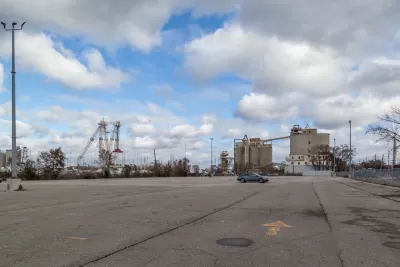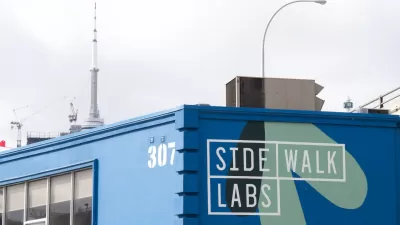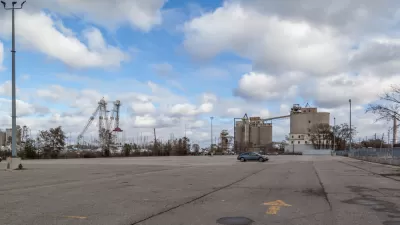Just shy of a year after Sidewalk Labs pulled the plug on its "smart city" experiment for Quayside, Waterfront Toronto has a released a request for qualifications to move forward with a new, "people-centered" vision for the waterfront.

Waterfront Toronto has launched a new international competition seeking a development partner for land in the Quayside area of the city—land previously planned for "smart city" experimentation by Sidewalk Labs, a subsidiary of Google parent company Alphabet.
After Sidewalk Labs canceled its plans in May 2020, citing the economic uncertainty of the pandemic as an obstacle for financial viability for the project. But the proposal was beset by controversy and a skeptical public throughout its process (which began in 2017 and produced a master plan in 2019).
According to a press release from Waterfront Toronto, the new project will strive for lofty design ambitions while also creating a sustainable community for people of all ages, backgrounds, abilities and incomes. "The first step in this effort is to issue a Request for Qualifications (RFQ) to identify potential development proponents with the proven experience, design portfolio, financial resources, and shared vision necessary to bring Quayside to reality," according ot the press release.
An article by Leyland Cecco, writing for The Guardian, focuses on the new "people-centered vision" for Quayside. The article inclues a soundbite from Mike Lydon, who says the failed Sidewalk Labs plan for Quayside is a cautionary tale for cities flirting with "smart city" technology. "To bet the farm on technology that redesigns our entire streets and relies on apps and sensors doesn’t really jive with how human beings actually use public spaces – and how they want to live in cities," says Lydon in the article.
FULL STORY: Toronto swaps Google-backed, not-so-smart city plans for people-centred vision

Alabama: Trump Terminates Settlements for Black Communities Harmed By Raw Sewage
Trump deemed the landmark civil rights agreement “illegal DEI and environmental justice policy.”

Study: Maui’s Plan to Convert Vacation Rentals to Long-Term Housing Could Cause Nearly $1 Billion Economic Loss
The plan would reduce visitor accommodation by 25% resulting in 1,900 jobs lost.

Planetizen Federal Action Tracker
A weekly monitor of how Trump’s orders and actions are impacting planners and planning in America.

Waymo Gets Permission to Map SF’s Market Street
If allowed to operate on the traffic-restricted street, Waymo’s autonomous taxis would have a leg up over ride-hailing competitors — and counter the city’s efforts to grow bike and pedestrian on the thoroughfare.

Parklet Symposium Highlights the Success of Shared Spaces
Parklets got a boost during the Covid-19 pandemic, when the concept was translated to outdoor dining programs that offered restaurants a lifeline during the shutdown.

Federal Homelessness Agency Places Entire Staff on Leave
The U.S. Interagency Council on Homelessness is the only federal agency dedicated to preventing and ending homelessness.
Urban Design for Planners 1: Software Tools
This six-course series explores essential urban design concepts using open source software and equips planners with the tools they need to participate fully in the urban design process.
Planning for Universal Design
Learn the tools for implementing Universal Design in planning regulations.
Caltrans
Smith Gee Studio
Institute for Housing and Urban Development Studies (IHS)
City of Grandview
Harvard GSD Executive Education
Toledo-Lucas County Plan Commissions
Salt Lake City
NYU Wagner Graduate School of Public Service




























